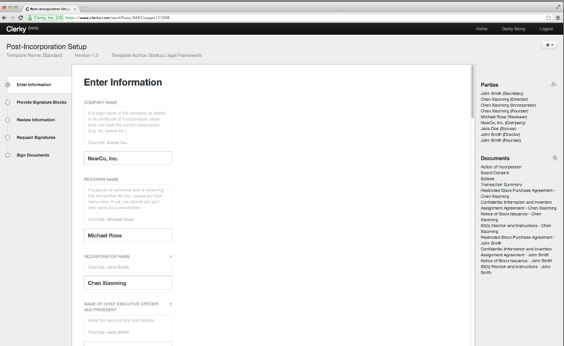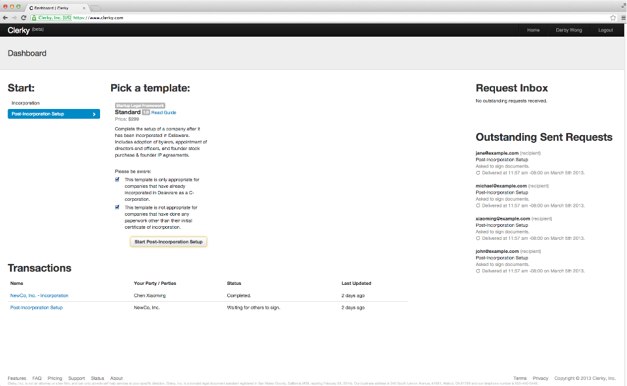When we cover a startup’s launch, we often focus on the market opportunity, funding and investors and how the company’s product is solving a particular problem. We rarely mention the initial set of challenges every entrepreneur must face when they actually turn an idea into a startup — incorporation, stock issuance documents and more. Most of the time, startups have to incur legal costs to do this. However, Clerky, a Y Combinator-backed startup launching today, is hoping to offer entrepreneurs a quality, cost-effective, automated way to handle incorporation documents and more.
Most companies and investors incorporate in Delaware. Clerky’s online platform basically takes care of all of the legal work necessary to create a Delaware C Corp and set up founders with proper vesting, invention assignment, and governance frameworks.
Here’s how it works. Founders enter email address and other info such as company name, board of directors and more into Clerky. Clerky then emails all the founders and involved parties, and in a few clicks everyone can digitally sign and date everything. Clerky handles all paperwork with the Secretary of State of Delaware. The whole process happens online and entrepreneurs turn their startups into a legal, valid Delaware C Corp.
The cost is $99 for incorporation (not including fees), and $299 for post-incorporation documents (founder stock issuance, bylaws, initial board consent, founder confidential information invention assignment agreement, 83b, action by incorporator forms).
Founders Chris Field and Darby Wong, who are engineers and were lawyers at firm Orrick prior to founding Clerky, explain that founders traditionally only had three options when incorporating. First, they could pay thousands of dollars to a lawyer. Second, they could consult a service like LegalZoom or another online law site to take care of these documents (but would not be getting professional attention), or third, they could try to do it themselves. In these cases, mistakes like typos can turn into months of administrative hassle with Delaware. There are over 100 fields that have to be filled our properly, and the incorporation and stock issuance documents can rise to up to 200 pages.
Field, who was actually one of the lead attorneys for Heroku in its acquisition by Salesforce, added that if startups end up using lawyers not well-versed in the needs of technology startups, there are many mistakes that can be made. For example, an 83(b) election, a form that documents stock being issued, could cost as much as half of the proceeds of a future liquidity event due to increased taxes and legal fees.
Y Combinator has been using Clerky in stealth for three full batches with over 100 startups incorporated using the service. The forms used were developed in cooperation with YC, Orrick, Imagine K12 and an incubator named Boost.
Kirsty Nathoo, Y Combinator’s CFO (read our profile of her here) says of Clerky, “I spend lots of time working with companies to fix problems with their formation, like incomplete documentation, non-standard terms, inconsistency, etc., which usually occur when founders try to handle it themselves. When Y Combinator funds an unincorporated startup, I send the founders to Clerky and know everything will be done correctly.”
Clerky did raise a small seed round of funding, but declined to reveal the amount or the investors.
Both Field and Wong see themselves as more of an enhancement for lawyers, rather than a competitor. For founders that have lawyers, Clerky allows them to save their legal fees for higher value services like advice and review of funding documents instead of the mundane paperwork with the state of Delaware.
In the future, the startup plans to add convertible notes and employee paperwork (which are both in private beta) to the other services available on the site.
I’d say anything that helps both entrepreneurs save money and focus on building their product is a win.


